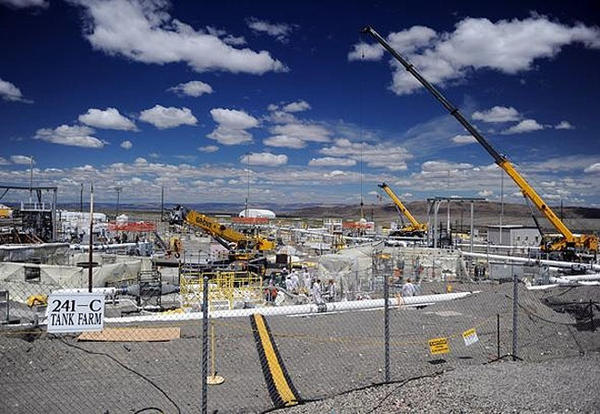
The First Hanford Tank Farm Is Almost Cleaned Out. Now What Happens?
Listen
A major milestone is approaching at the Hanford Site in southeast Washington state. After nearly two decades of work, contractors have just finished cleaning out the first group of 16 radioactive waste tanks.
After the tank farm is officially declared cleaned out by Washington’s Department of Ecology, the federal government has to decide what to do with the tanks themselves.
Either all the tanks, contaminated soil and equipment and piping would have to be dug up and disposed of—a hazardous and expensive job—or the U.S. Department of Energy would have to make its case to leave the tanks in place, sealing them off.
Ecology said the feds might be proposing the landfill option soon. That would mean contractors would clean up ‘hot spots’ of soil, grout the tanks closed forever and probably cover the entire farm with some kind of structure so rainwater couldn’t seep in.
Ecology officials think a plan will be rolled out to the public in the first half of 2018.
In total, there are 177 tanks at Hanford. They hold more than 50 million gallons of highly radioactive sludge. About 1 million gallons of waste has already leaked from multiple tanks already. The federal government has spent millions of dollars transferring waste from older single-hulled tanks to newer double-hulled tanks.
All of the tanks at Hanford date back to World War II and the Cold War. The tank waste is leftover from making plutonium for nuclear bombs.
The federal government is still trying to build a huge factory to treat all the radioactive waste. But that factory has been under a lot of scrutiny as it has cost more and taken much longer than planned.
9(MDAyNTQ1NzQ1MDEyMjk0OTcxNTI4MzljZQ001))
Related Stories:

Astronauta de la NASA José Hernández inspira a estudiantes durante visita a Tri-Cities
EL astronauta de la NASA José Hernández visitó el este de Washington y compartió su historia de resiliencia y determinación con estudiantes locales.

Washington, Idaho rank high for public health emergency preparedness
Both states saw steady or increased funding for public health, but Idaho still among lowest for vaccinations.

How does climate affect your life? Tri-Cities survey open now
Cities, towns and counties are starting to plan for a future with climate change. Now, the Tri-Cities area is asking people about regional hazards and historical trends. (Credit: Simon Foot












